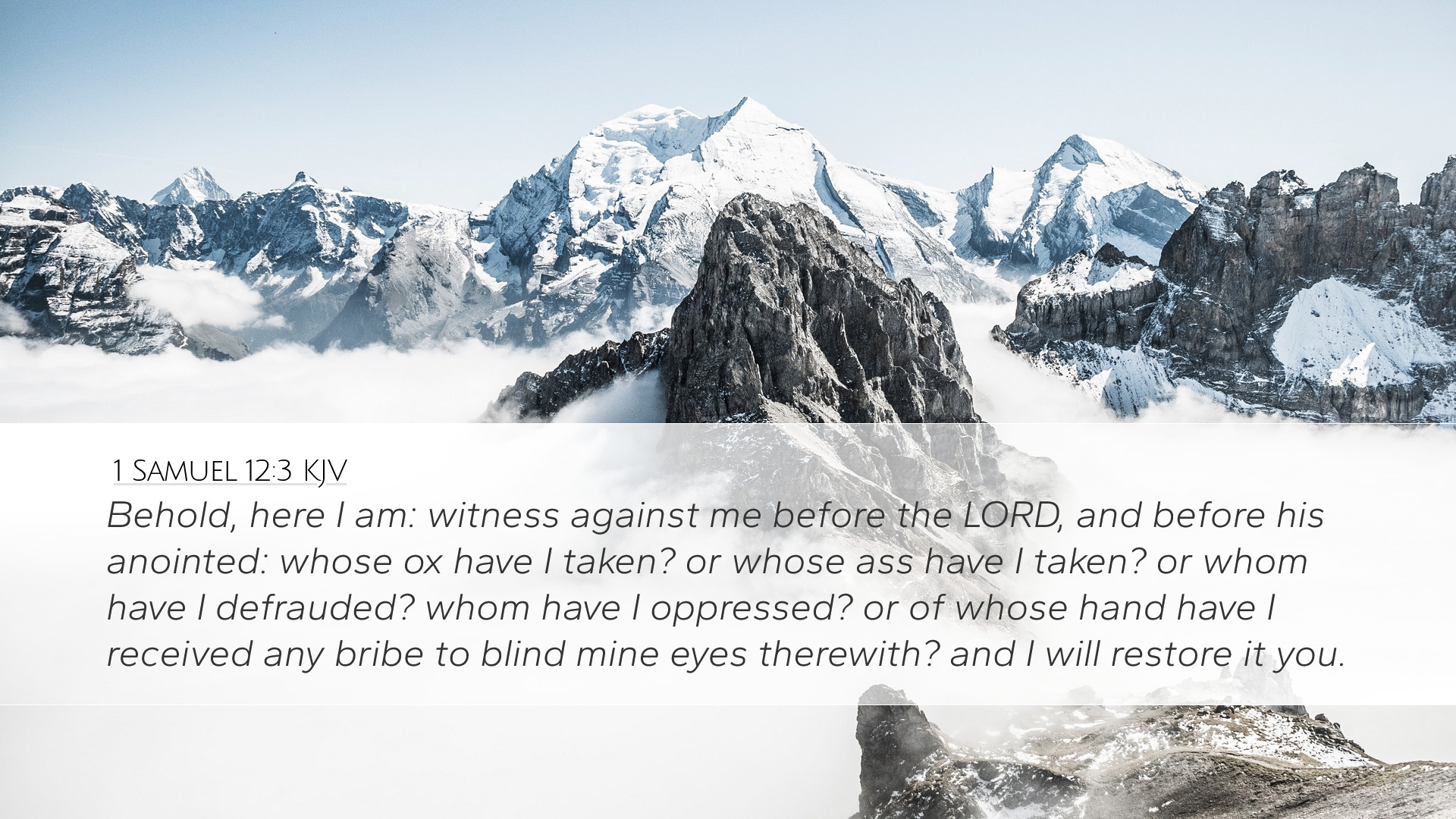1 Samuel 12:3 - Commentary Overview
The verse 1 Samuel 12:3 states:
"Here I am; testify against me before the Lord and before his anointed. Whose ox have I taken? Or whose donkey have I stolen? And if I have defrauded any man, or oppressed him, or taken anything from his hand without compensation, I will restore it to you."
Contextual Background
This verse comes at a crucial point in the narrative of 1 Samuel. Samuel, the prophet, is addressing the people of Israel as he concludes his leadership and affirms the transition to monarchy under Saul. It is a moment of reflection where Samuel calls upon his integrity and his commitment to just leadership, inviting the people to witness his life among them.
Insights from Public Domain Commentaries
Matthew Henry's Commentary
Matthew Henry highlights that Samuel's appeal to his integrity is significant in a culture where leadership could easily fall into corruption.
Key points from Henry's analysis:
- Samuel's rhetorical questions illustrate his unblemished conduct as a leader.
- By invoking "the Lord and his anointed," he underscores his accountability to God.
- His call to the people to testify reflects the importance of public accountability in leadership.
- Henry emphasizes that integrity is foundational for any leader, setting a precedent for how kings and rulers should operate.
Albert Barnes' Notes on the Bible
Albert Barnes presents a straightforward clarification of the verse, noting that Samuel is essentially challenging the people to examine his life.
Significant takeaways from Barnes:
- He reflects on the importance of personal integrity in leadership roles.
- Barnes argues that Samuel's innocence is crucial in affirming God's choice of Saul as king.
- He emphasizes the principle of restitution and reparation in cases of wrongdoing, showcasing Samuel’s commitment to justice.
Adam Clarke's Commentary
Adam Clarke takes a more pastoral approach in his commentary, analyzing the implications of Samuel's challenge to the people.
Clarke's insights include:
- Clarke suggests that Samuel’s challenge is a testament to the spiritual health of Israel at the time.
- He points out the psychological effects of a leader’s transparency and the trust it fosters among the people.
- Clarke explores the broader implications of accountability in ministry and the aspirations for a holy life.
Theological Reflections
The theological implications of 1 Samuel 12:3 present several layers for consideration, particularly in the context of pastoral leadership and ethical conduct.
Key theological reflections include:
- Accountability to God: Leaders must recognize their ultimate accountability to God, a theme that resonates throughout Scripture.
- Integrity and Witness: Integrity is critical not just for effective leadership but for being a credible witness of God's character.
- Principle of Restitution: Samuel’s invitation to restore anything taken without compensation reflects a biblical ethic of justice that is applicable today.
- Community Engagement: The call for community testimonial underscores the importance of communal integrity and the collective responsibility of believers.
Practical Applications for Leaders
1 Samuel 12:3 serves as a compelling model for current leaders in the church and beyond.
Practical applications may include:
- Self-Examination: Leaders should regularly evaluate their actions and decisions, ensuring alignment with biblical standards.
- Seeking Forgiveness: When failing, leaders ought to seek forgiveness and make amends, setting an example for their followers.
- Fostering Transparency: Building a culture of transparency can strengthen trust between leaders and congregants.
- Promoting Accountability: Formal structures for accountability within church leadership can enhance moral integrity.
Conclusion
The dialogue in 1 Samuel 12:3 invites deep reflection on the nature of leadership and integrity.
As pastors, students, and theologians study this verse, it reveals timeless truths about accountability, transparency, and the ethical obligations of those in leadership. Samuel’s approach remains a model for how leaders should live and serve, calling for a commitment to justice, integrity, and community engagement.


